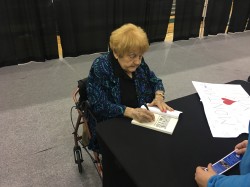Culture | November 9th, 2016

By Amy Venn amyvenn86@gmail.com
Eva Mozes Kor stopped by Williston State College last Wednesday with her unique message of forgiveness and determination in the face of adversity. Kor’s startling recollection of her time at Auschwitz made the attending audience wonder how she could possibly have survived the Holocaust; but survive she did.
“It was the dawn of a new spring day in 1944,” Kor began her lecture to the overflowing crowd, “Our cattle car train came to a sudden stop. We had been cooped there for four days, a hundred people with no room to sit.” Within that cattle car was Kor’s father, Alexander, age 44; her mother, Jaffa, age 38; her two older sisters, Edit and Aliz, 14 and 12 respectively; and finally, Eva and her twin sister Miriam, age 10.
The Mozes family came off the cattle car onto what was known as the “selection platform,” where it was decided which people would live or die before even getting inside Auschwitz. “I’ve never forgotten the selection platform. A place where millions of people were ripped apart from their families forever,” Kor said.
Kor’s mother held tightly to the twin girls, hoping to provide them with some sort of maternal protection. Upon looking around, Kor realized that within the first moments on the platform, her father and older sisters had been lost in the crowd, never to be seen again. Suddenly, a Nazi came rushing towards the girls yelling, “Twins! Twins!” in German. Kor’s mother was startled as she was asked if the girls were in fact identical twins.
“Is that good?” Jaffa asked.
“Yes,” the Nazi replied. With that the girls were torn from their mother’s outstretched arms and taken deep within Auschwitz where they became subject to Nazi medical experiments.
The conditions were unimaginable and deplorable. Eva and Miriam were sleeping on the floor among rats. “We had no idea what would become of us,” Kor said, “It was filthy and crude.” Kor remembers going to the latrine that first night and seeing the bodies of three dead children lying on the floor. “I had never seen anybody dead before, but it was clear that in this place, children were dying.”
“I made a silent pledge that I would do anything and everything in my power to make sure that Miriam and I would not end up on that latrine floor,” Kor recalled, “From the moment we left that latrine, I did everything instinctively right. I even developed an image in my mind of how Miriam and I might look as we walked out of this camp alive.”
The medical experiments performed at Auschwitz are still largely unknown. Kor and her twin were the subjects of the now infamous Nazi doctor Josef Mengele, also known as the “Angel of Death.” Experiments were performed without any consent of the subjects.
Eva and Miriam were Injected with different combinations of chemicals three times or more each week for the entire year they were captive, resulting in extreme illness at the time and later in life. Miriam eventually passed away due to cancer that was likely caused by the medical experiments of her childhood.
The twins were rescued upon the liberation of Auschwitz by the Soviet Union in January, 1945. They both immigrated to Israel in 1950, where Kor received an education and served in the Israeli Army. It was there that she met a fellow Holocaust survivor and new American, Michael Kor, who she married and eventually moved with to the United States.
Upon Miriam’s death in 1993, Kor opened the CANDLES Holocaust Museum in Terre Haute, Indiana, in honor of her late sister. She also began her own personal path of forgiveness, hope, and lecturing. “I have forgiven the Nazis,” Kor said, “And if anyone would have asked me if I was going to forgive the Nazis 23 years ago, I would have told you to find a really good psychiatrist and have your head examined.”
Kor is honest with herself about her past. “I was a very good victim. I was angry with the world. Nothing changed in my life until 1993 when Miriam died.” She has since met with a Nazi doctor from Auschwitz in person and has given him her forgiveness.
Kor has also expressed her forgiveness for Mengele, a man who escaped conviction of his war crimes and was speculated to have died in South America in 1979. “I thought of the greatest gift I could give myself. I discovered I had the power to forgive.”
“It was a very interesting feeling to realize that I, as a little victim of almost 50 years, had the power even over the Angel of Death,” Kor said, “And if I could forgive Mengele, I decided to forgive everybody who had ever hurt me.”
The Eva Mozes Kor lecture was free for all who attended and was brought to WSC on behalf of the President of the college, WSC Foundation, the Arts and Human Services Department and Student Life.
February 23rd 2026
February 16th 2026
February 13th 2026
January 15th 2026
January 15th 2026
__293px-wide.png)

_(1)_(1)_(1)_(1)_(1)__293px-wide.jpg)
_(1)__293px-wide.jpg)

